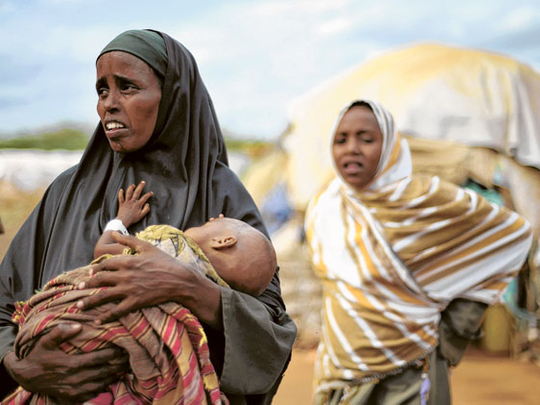
Rome: The UN food agency FAO will host emergency talks on the Horn of Africa drought crisis in Rome Monday as aid groups scramble to raise money for an estimated 12 million people on the brink of starvation.
UN Secretary General Ban Ki-moon has called on donor countries to come up with $1.6 billion (Dh5.87 billion) in aid for two regions of southern Somalia that were declared famine zones by the United Nations this month.
Head of emergency operations in Africa for the UN's Food and Agriculture Organisation (FAO) Cristina Amaral warned yesterday it wasn't enough for donor countries to stump up some cash for immediate food aid and that there needs to be long-term investment to help farmers resist droughts and international mediation to bring peace to war-torn Somalia.
"When we have a declaration of famine in the 21st century, we should consider this immoral," Amaral said.
Amaral said the fact that children are dying of hunger is "immoral".
"We're afraid that things will get worse in the coming months if nothing is done now. The main aim of the meeting is to call the political attention of leaders of the world," said Amaral, who is helping to organise the talks. Ministers, aid chiefs and charities are meeting to discuss ways of stepping up food supplies and delivering them to the epicentre of the famine in southern Somalia, much of which is under the control of militants.
Crisis warning
"Without access to south Somalia, we're only seeing the tip of the iceberg — those refugees arriving in Kenya and Ethiopia," Amaral said. "There are many more — we estimate 3.7 million — that need emergency assistance," she added.
Amaral has been warning about the crisis facing the drought-stricken region since November, after the rainy season failed.
"War has become a normality there. You only hear about Somalia when there are pirates," she added.
The Al Qaida-inspired Al Shabab group has banned humanitarian aid agencies like the World Food Programme from working in the region, although FAO has been able to operate several small programmes to help farmers through local partners.
The UN says tens of thousands of people have been killed by the worst drought in 60 years, which has wreaked havoc in Somalia but has also hit more widely in parts of Djibouti, Ethiopia, Kenya, Sudan and Uganda.












